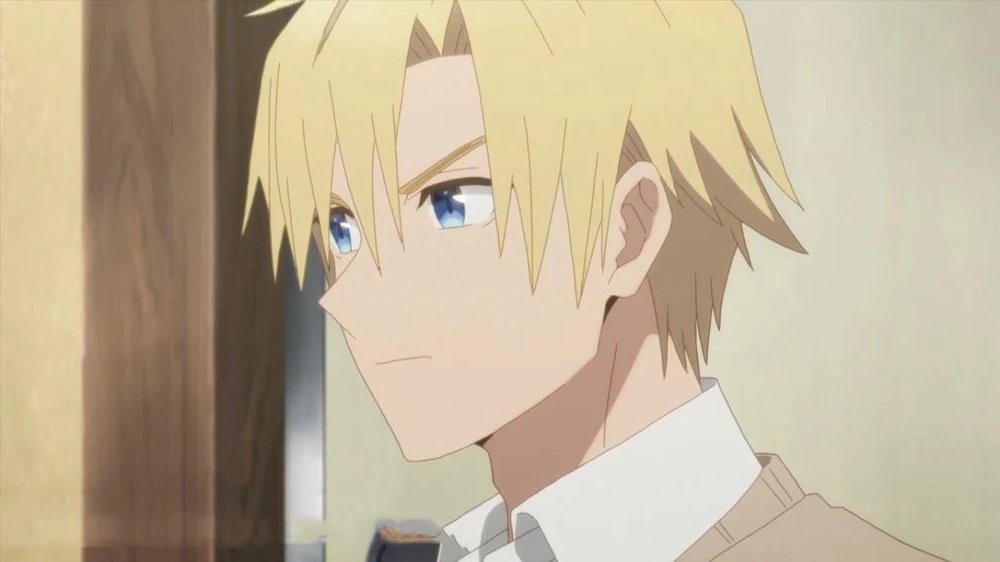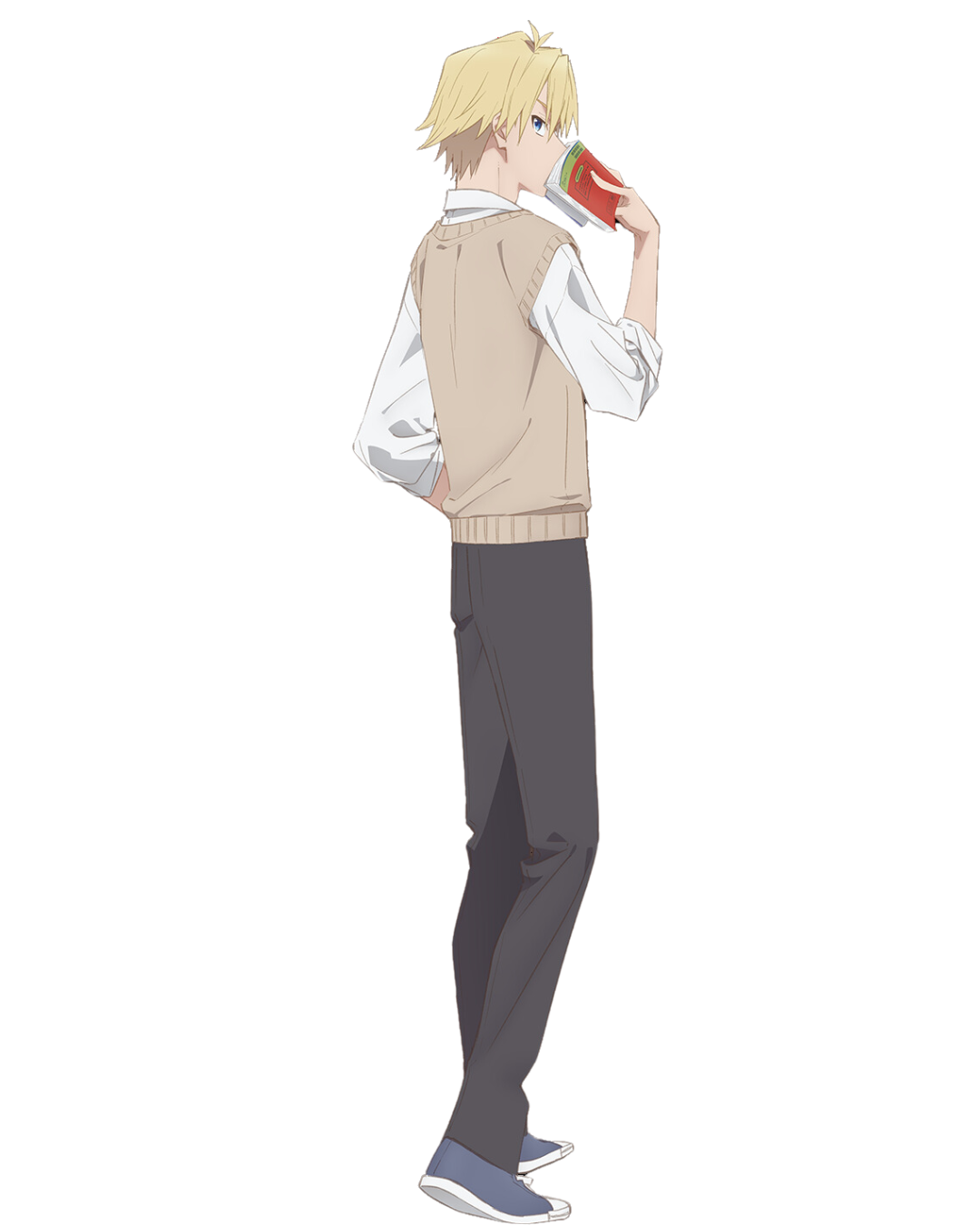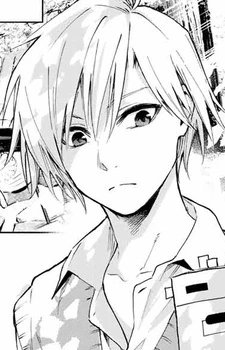
Uryuu Kamihate
Uryū Kamihate |
|
|---|---|
 |
|
| Full Name | Uryū Kamihate |
| Kanji | 上終 瓜生 |
| Romaji | Kamihate Uryū |
| Personal Information | |
| Birthday | January 21st, 2004 |
| Age | 18 |
| Gender | Male |
| Blood Type | A |
| Horoscope | Aquarius  |
| Characteristics | |
| Eye Color | Black |
| Hair Color | White |
| Affiliations | |
| Affiliations | Amagami Shrine |
| Relatives | |
| Relatives |
|
| Occupations | |
| Occupations | High-School Student |
| Debut | |
| Manga | Volume 1, Chapter 1 |
| Anime | Season 1, Episode 1 |
| Portrayal | |
| Japanese VA |
|
| English VA | Branden Loera |
Appearance
Uryū Kamihate is distinguished by his striking blond hair, which is styled in a sharp, angular cut that enhances his youthful and somewhat mysterious appearance. His hair is slightly tousled, adding to his dynamic look, and contrasts with his calm demeanor. His eyes, though not described in great detail, often reflect a sense of quiet determination, hinting at the inner complexities of his character. The sharpness of his hairstyle complements his role in the story, symbolizing both his outsider status as an orphan and his eventual integration into the intricate family dynamics of the Amagami Shrine.


Personality
Uryū Kamihate is initially portrayed as someone with a deeply headstrong, secular worldview. He holds a strong dismissal of religious beliefs, often viewing them through a lens of skepticism and practicality. His focus is entirely on the tangible and the scientific, with a particular dedication to the field of medicine. Uryū is a hard-working and disciplined individual, driven by his ambition to become a doctor. His rigorous studies have earned him a vast body of medical knowledge, a ament to his relentless pursuit of expertise and his belief in the power of reason and empirical evidence over spiritual or supernatural explanations.
However, as Uryū’s life intertwines more with the pious Amagami household, his views begin to shift. The constant presence of the shrine’s religious atmosphere and the mystical events surrounding it gradually challenge his previously unwavering stance. While he remains firmly committed to his secular goals and the pursuit of medicine, Uryū becomes more open-minded toward the supernatural and the idea of gods. Over time, he finds himself grappling with a delicate balance—acknowledging the spiritual aspects of his new life without abandoning his core belief in reason and the practical world.
Background
Uryū Kamihate’s journey into the world of medicine and his eventual path toward becoming a doctor began in his childhood, shaped by personal tragedy. When he was very young, his mother fell gravely ill, and despite his best efforts to understand her condition and seek a cure, she eventually passed away. This devastating loss had a profound impact on Uryū, igniting in him a strong desire to prevent others from experiencing the same helplessness he had felt. Driven by the memory of his mother’s illness and death, he vowed to dedicate his life to studying medicine, hoping that one day he could help save others from suffering as he had.
After his mother’s passing, Uryū was left orphaned and alone. It was during this difficult period that he was taken in by Mahiru Anekoji, the compassionate caretaker of an orphanage. Under her guidance, Uryū found not only shelter but also a sense of stability and hope. Mahiru treated him like family, providing him with the support and care he needed to continue pursuing his dreams. This experience, combined with his natural drive, set the foundation for Uryū’s intense academic focus and his eventual arrival at the Amagami Shrine, where his journey would take an unexpected turn, blending his medical aspirations with a deeper connection to spirituality.
Relationships
Yae Amagami
Yae is the eldest of the Amagami sisters and plays a central role in Uryū’s life, both as a guiding figure and a source of emotional support. With a calm, composed, and motherly demeanor, she often assumes the responsibility of looking after her younger sisters and managing the affairs of the household. Yae’s nurturing nature profoundly influences Uryū, offering him a sense of stability and care he has rarely experienced. Their relationship begins with mutual respect, as Yae’s mature, thoughtful approach to life contrasts with Uryū’s more pragmatic and secular perspective. Over time, this respect develops into something deeper, with subtle hints of romantic tension, as the two grow closer in understanding each other’s hopes and struggles.
Yuna Amagami
Yuna, the second sister, is a fiery and fiercely independent individual who stands out for her strong-willed and determined personality. When Uryū first arrives at the Amagami household, their interactions are often marked by tension and clashes, as Yuna’s headstrong nature frequently puts her at odds with Uryū’s pragmatic views. However, as they spend more time together, their relationship evolves into one of mutual understanding, with playful banter and lighthearted arguments that hint at a growing affection. Yuna’s boldness challenges Uryū’s more reserved nature, and their contrasting personalities spark a dynamic relationship built on both conflict and connection.
Asahi Amagami
Asahi, the youngest of the Amagami sisters, is the embodiment of cheerfulness and energy. Her lively and mischievous spirit brings a sense of joy and playfulness to Uryū’s often serious life. Known for teasing him and injecting humor into their interactions, Asahi offers a refreshing contrast to Uryū’s grounded and more reserved demeanor. While she enjoys lighthearted teasing, there is a deeper sense of camaraderie between them, with Asahi’s youthful exuberance often lifting Uryū’s spirits and encouraging him to embrace a more carefree side of life.
Mahiru Anekoji
Mahiru Anekoji is a close friend of the Amagami sisters and an important figure in Uryū’s life. With her refined and elegant demeanor, Mahiru presents herself as composed and sophisticated, but beneath this exterior lies a deeply supportive and kind-hearted individual. Often acting as a mediator between Uryū and the Amagami sisters, she helps navigate the complex dynamics of their relationships, smoothing over conflicts and offering wise counsel when needed. Though their connection is rooted in friendship, there are occasional romantic undertones that emerge, suggesting that their bond may grow into something deeper as the story unfolds.
Shirahi Tsuruyama
Shirahi Tsuruyama is a character shrouded in mystery, whose enigmatic personality adds a layer of intrigue to the narrative. Her cryptic and occasionally aloof demeanor keeps Uryū on his toes, as she frequently offers subtle advice and commentary that challenges his worldview. Although her role in Uryū’s life is not as prominent as the Amagami sisters, her influence is felt through the moments of introspection and guidance she provides. Shirahi’s mysterious aura makes her an intriguing figure in Uryū’s journey, and her actions may ultimately lead him down paths of self-discovery.
Azuki Inugami
Azuki Inugami is one of Uryū’s most loyal and dependable friends, offering a sense of stability and trust in his life. Known for her strong-willed and straightforward nature, Azuki does not hesitate to speak her mind or stand by Uryū when he needs support. Their relationship is primarily platonic, based on mutual respect and shared values. Azuki’s unwavering dedication to Uryū provides him with a sense of grounded companionship, and her direct approach to life contrasts with Uryū’s more introspective tendencies. Her loyalty and friendship are crucial to Uryū’s emotional well-being as he navigates the complex relationships within the Amagami household.
Etymology
The name Uryū (上かみ終はて 瓜う生りゅう) is derived from two kanji characters: 瓜 (U), meaning “melon,” and 生 (Ryū), meaning “life” or “living.” The combination of these characters evokes the image of something that is both natural and full of life, with melon symbolizing growth and vitality. The choice of this name reflects Uryū’s character, particularly his desire for personal growth and his connection to life’s fleeting nature.
Uryū’s surname, Kamihate (上かみ終はて), is also meaningful. The first kanji, 上 (kami), means “above,” “top,” or “upper,” suggesting a sense of hierarchy or elevated position. The second kanji, 終 (hate), means “end” or “finish,” indicating a sense of completion or conclusion. Together, Kamihate can be interpreted as “the top of the end” or “the end of something elevated,” which may reflect the challenges and pivotal moments in Uryū’s journey, as well as his position within the story’s unfolding events.
Additionally, the kanji kami (神) can also mean “God” or “deity,” adding a layer of spiritual or divine connotation to Uryū’s surname. This dual meaning may hint at the eventual blending of his secular beliefs with the supernatural elements that play a significant role in his life at the Amagami Shrine.